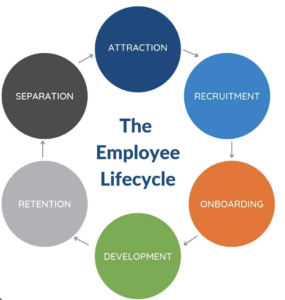When you hire a new team member, there will usually be a probationary period. This is a time during which both parties can establish if hiring them was the right decision. It’s a fixed amount of time, so proactively managing probationary periods is important. If it applies, details of a probationary period must be included in employment contracts. Wording should include the duration, the right to extend, and areas of their performance and conduct which will be considered.
Many companies have rebranded the probationary period, using terms like ‘Introductory Period’ or ’90-day journey’. They mean the same thing; Was hiring the new joiner the right decision?
Probationary periods ensure that an employee’s expectations are managed. They understand that what they do during that time matters and can affect their ongoing employment. If the end of a probationary period goes left unchecked, the default position is that they have successfully passed. This may result in changes to their entitlements and notice period, and it’s more difficult to address those issues after that.
Areas to consider
When it comes to assessing whether the hiring decision, it shouldn’t just be about technical ability in their field of expertise. It’s about the behaviour they demonstrate, their understanding of the business or their desire and enthusiasm to learn and make a positive contribution. In an SME one person can make a big difference to the team dynamic and the success of the business. Therefore, it’s important that you use the probationary period to determine if you made the right decision. The probation period is also about the employee deciding if this is the right place for them. It’s important that you engage in two-way dialogue about how they’re getting on. The probationary period provides an opportunity to ‘course correct’ if things doing seem to be going to plan, either for you, the team or the new hire.
Tips for managing a successful probation
Managers need to spend time proactively managing probationary periods. It should be expected that more management time will be spent on this person during that time. The time you spend is an investment which will hopefully lead to a direct return.
So what should managers be doing during their new hire’s probation? Here are our top 10 tips:
- Clear job information: Make sure all the relevant information is clearly communicated during the recruitment process. That way there is no ambiguity about the role and what it involves
- Effective induction: Ensure you have an effective induction programme. This should include information about their job, the team, the business and the way it’s structured. It should also include where they fit in, the values of the company and how you expect employees to behave at work
- Introductions to key people: Ensure the new hire is introduced to key people on day one or at least during their first week. That way they know where to go for support if they have questions. No-one can know everything from day one
- Meet regularly: Meet with the new hire 1-1 regularly and frequently, and make sure it’s diarised and a written note is taken and shared with them in a timely way. In these meetings you can ensure they know what they should be doing. You can provide regular feedback about how it’s going, both from the perspective of their work, as well as their behaviour. For example if their work has been accurate, or you have noticed they have been late multiple times during their first week / month. Flag what you have noticed, ask how they feel it’s going and if there is anything they’re not sure about
- Set SMART objectives: Set some agreed objectives for the first month, and / or overall for their first 3 or 6 months. Progression towards meeting the objectives should also become an area of feedback in your weekly meetings, and follow up on email with the key points
- Be accessible and approachable: Have ad hoc informal catch-ups with the new hire on the ‘shop floor’. Ensure your new hire has the opportunity to ask any questions they may have
- Flag issues and concerns: If there are issues, flag them sensitively, but honestly. Explain why it’s a problem, and what you expected instead, or better still, ask them how they could have avoided the issue
- Timely feedback: Ensure your feedback is given in a timely way. If something serious is wrong, don’t wait for the next 1-1 meeting
- Preparation for meetings: Provide feedback in a confidential setting away from colleagues to protect their dignity. Prepare feedback properly to ensure it’s objective and delivered thoughtfully
- Act prior to the end of probation: Make sure you meet with the new joiner before the end of the official probationary period to confirm formally if they have passed their probation. Alternatively, probation can be extended if there are ongoing issues which need to be addressed. Equally if there are too many issues you may have to deliver the news that the probation has not been successful. (i.e. you give notice to terminate their employment)
As people managers it’s in your interests to do all you can to set this person up to succeed. This avoids unnecessary additional time and resource in sourcing a new hire twice in a short period of time. That said, sometimes things don’t work out. If that’s the case, dealing with it promptly and decisively will save time and money.
Recruitment can be expensive and time-consuming, so making sure your initial recruitment process was appropriate will help. Read our previous blog here about recruitment if you want more tips for successful recruitment.
If you would like support managing probationary periods, or you have an issue with a new hire, get in touch.


Recent Comments